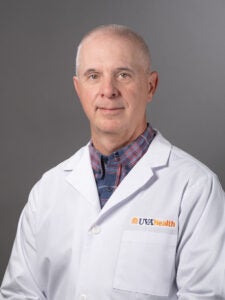
Victor Laubach, PhD
The UVA Department of Surgery announces the retirement of Victor E. Laubach, PhD, a distinguished Professor of Surgery who has served at UVA for over 28 years. Dr. Laubach’s groundbreaking research has significantly advanced our understanding of ischemia-reperfusion injury, particularly in the context of lung transplantation.
Dr. Laubach earned his BS in Biology from Pennsylvania State University and his PhD in Genetics from the George Washington University School of Medicine. His graduate research, conducted in the Pulmonary Branch of the National Heart, Lung, and Blood Institute (NHLBI) in Bethesda, MD, focused on alpha-1-antitrypsin deficiency.
He then completed postdoctoral research at Glaxo Wellcome Pharmaceuticals in Research Triangle Park, NC, where he studied nitric oxide biology. During this time, he collaborated with the late Dr. Oliver Smithies, recipient of the 2007 Nobel Prize in Physiology or Medicine, to generate iNOS and eNOS knockout mouse models.
Since joining UVA, he has made enduring contributions in cardiovascular biology, immunology, molecular biology, and translational science. He served as the director of UVA’s Lung Transplant and Injury Research Lab, a collaborative group of clinicians, faculty, staff, and students dedicated to improving patient outcomes through innovative basic and translational research. Under his leadership, the lab utilized both in vivo and in vitro models to study clinically relevant issues, including mechanisms of lung ischemia-reperfusion injury (IRI), organ preservation, and advanced perfusion techniques such as ex vivo lung perfusion (EVLP) and in vivo lung perfusion (IVLP).
Dr. Laubach has been a prolific contributor to the scientific community, publishing extensively and mentoring countless researchers and clinicians. His dedication to advancing science and improving patient outcomes has left an indelible mark on the field of surgery and the broader medical community.
Although Dr. Laubach’s last full-time day at UVA will be March 3, 2025, we are fortunate that he will continue to lend his expertise in a part-time capacity. We invite colleagues, students, and friends to join us in celebrating Dr. Laubach’s extraordinary career and wishing him the best in his retirement!
